The Apple iPad Pro Review
by Ryan Smith, Joshua Ho & Brandon Chester on January 22, 2016 8:10 AM ESTBattery Life
Battery life is important beyond any doubt. No one wants a tablet or phone that can only spend three hours away from a charger before it dies, no matter how good the device is. While such battery life might be incredible for a desktop replacement or anything else that realistically spends most of its life plugged into a charger, mobile devices are usually carried on the go and used far away from a charger for significant amounts of time. Probably the ultimate example of this is travel, where one might use a tablet to watch movies and browse the internet for a few hours over the course of a flight.
As a result, a significant portion of our reviewing efforts are devoted to determining battery life. In order to quantify battery life, there are inevitably a lot of test cases to cover. Some people might spend most of their time in an e-reader app, others might spend most of their time playing games or similarly intensive tasks on their phones. There’s no real standard for usage, so a tablet that might last a day for one person could last a week. As a result, the goal of our testing is to provide a useful relative comparison. In order to do this, we attempt to equalize for variables like display brightness by setting all displays to 200 nits for battery life testing. Due to the inability to completely eliminate the variables that come with live network testing, we also use strong network reception with high throughput on LTE to ensure that things like power amplifiers are either at a low power setting or bypassed entirely.
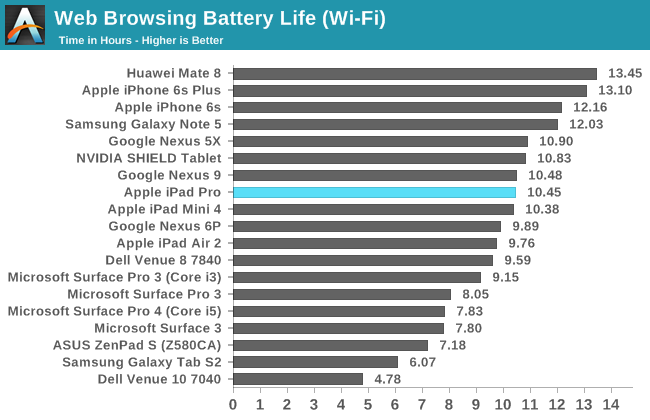
Our first test is the venerable web browsing test, in which we load a selection of web pages from full charge until the device shuts off from lack of battery charge. In WiFi battery life is pretty much identical to the iPad Air 2, which might be surprising given that the battery is only 41% larger. That might sound like a lot, but the display of the iPad Pro is 77% larger at the same 264 PPI pixel density, which means that there’s a pretty sizeable efficiency gap between the iPad Air 2 and iPad Pro. The improved display and SoC are likely to be the main reasons for this, as the 20nm SoC process that was used to make the A8 SoC was quite leaky due to its traditional planar transistor structure compared to the FinFET process used in the A9X.
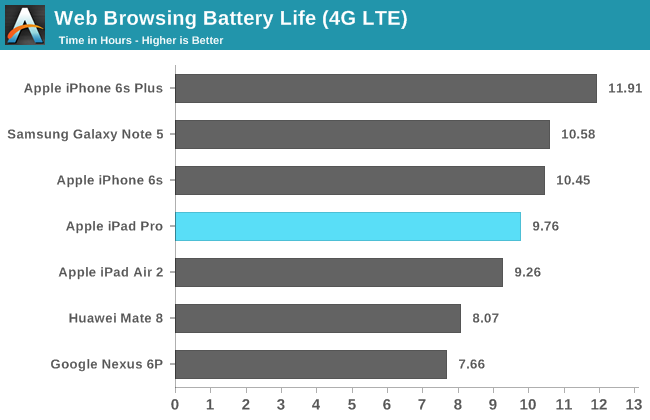
Interestingly, for whatever reason when re-running the same test on LTE battery life is noticeably different when compared to the iPad Air 2, where LTE and WiFi battery life were relatively close. I suspect that RF power is pretty similar between the two devices, but due to efficiency improvements on the display/SoC side the difference in battery life due to additional RF power consumption is magnified.
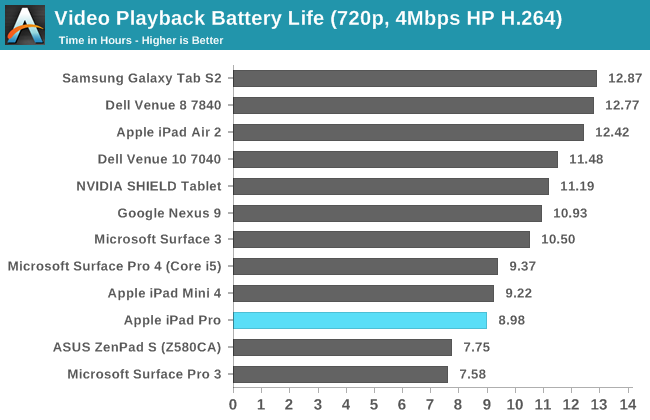
The more interesting test result that I encountered over the course of battery life testing was our tablet video rundown test. For whatever reason, web browsing clearly lasts a decent amount longer. It's pretty unlikely that the web browser has a lower SoC load when video is basically entirely dependent upon fixed function hardware decode. The most plausible explanation here for me is that we're seeing differences that arise from panel self-refresh, which can kick in on our web browsing test while the same definitely doesn't hold for our video test, which basically requires at least 30 FPS refresh rate continuously for the entire duration of the test. Overall that this makes the iPad Pro worse for content consumption, given Apple's content creation goals, is an unexpected turn of events.
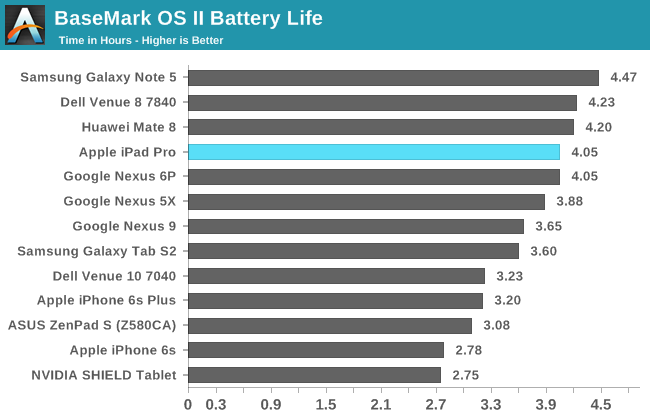
Moving on to the more SoC-bound tasks, we can start by looking at Basemark OS II, which is basically a CPU power virus that can be used to examine the upper bound for device TDP, in addition to nominal sustained CPU load. It’s evident from this test and some back of the envelope calculation that total device TDP excluding display power is roughly 5W, which is about right given the size of the device. This suggests that the A9X can be directly compared to Intel’s Core M in both performance and power, for better or for worse. Performance here is good, with relatively low throttling due to the use of a FinFET process and solid implementation of the Twister architecture.
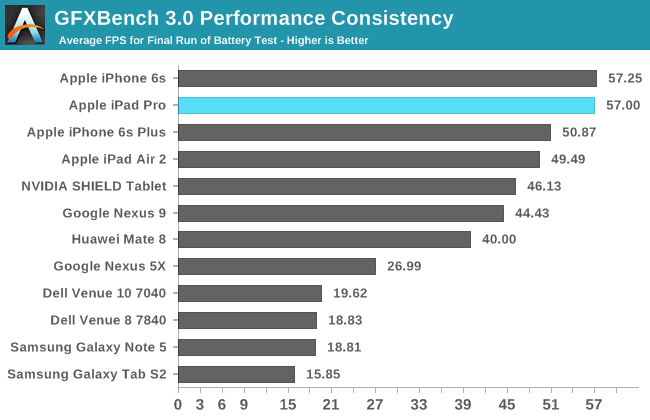
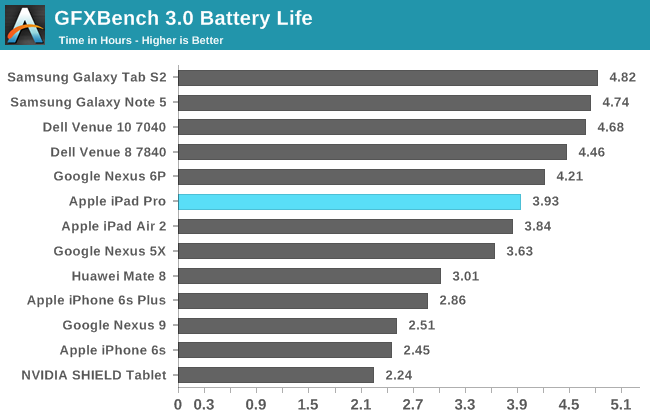
In our GPU throttling test, the A9X has effectively made it impossible to actually use T-Rex as a throttling test as it’s essentially pegged at vsync for the entire duration of the test. The iPad Pro also lasts a similar amount of time here as on the Basemark OS II test, which suggests that this test is still reaching TDP limits for the GPU, even if it doesn't manifest in the form of reduced performance.
Charge Time
While battery life is important, any time you’re dealing with a mobile device the time it takes to charge the battery is important as well. The usual example here is travel, but simply forgetting to plug in a device overnight can show the importance of charge rate. In the case of the iPad Pro, Apple ships it with their usual 12W charger. One might be tempted to suggest that the battery would be charged in about 3.5 hours, but it’s necessary to get the data and avoid speculation on something like this. In order to test how quickly the iPad Pro charges, we measure the difference in time between first plugging in a fully discharged tablet and when the charge is complete based upon power draw at the AC adapter.
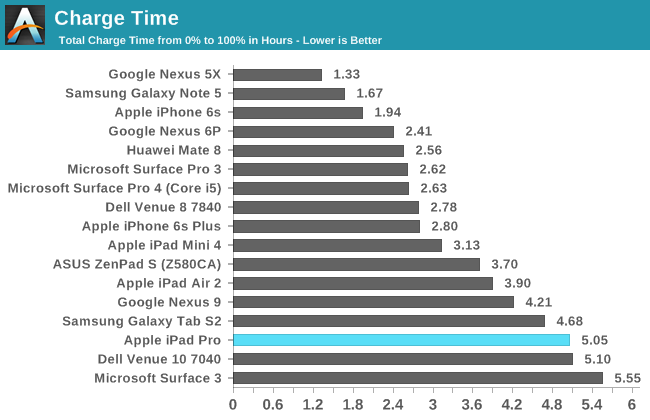
Interestingly, the iPad Pro takes a pretty significant amount of time to charge, at over a full hour longer than the iPad Air 2. While some might be okay with this, it’s definitely a sore spot for the iPad Pro as a higher voltage charger would be able to charge the device at a more acceptable rate. I’m not really sure why Apple decided to go this route, but there’s really no clear solution here unlike the case of the iPhone 6s Plus. The charger also definitely isn’t enough to ensure that you’re always charging the iPad Pro while in use either if the SoC is in overdrive/turbo states as thermally constrained power draw is already around 9-10W.
Despite the long charge time, overall the iPad Pro is quite mobile. However, it does regress somewhat relative to the iPad Air 2 due to its longer charge time, even if battery life is equivalent. Depending upon your use case though it might be difficult, if not impossible to tell the difference.


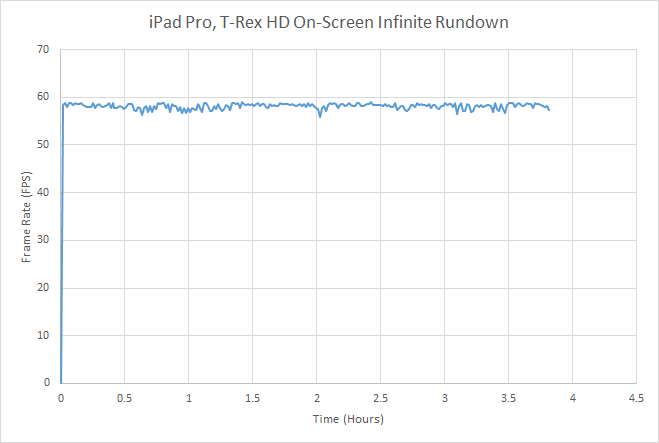








408 Comments
View All Comments
tim851 - Friday, January 22, 2016 - link
"Pro" is just a marketing moniker. There are smartphones that carry it.Apple wants iOS to succeed. People wonder if OSX will come to the iPad, I think Apple would rather consider bringing iOS to Macs. They are fanatical about simplicity and an iPad with iOS got that in spades.
And that's why they are taking the opposite approach of Microsoft.
Microsoft is trying to make their desktop OS touch-friendly enough. Apple is trying to make their touch OS productive enough.
Windows devs are by and large ignoring Metro, the tough UI, and just deploy desktop apps. Apple wants to force devs to find ways to bring professional grade software to iOS.
I'm quite happy that the two companies are exploring different avenues instead of racing into the same direction.
ddriver - Friday, January 22, 2016 - link
"I'm quite happy"People should really have higher standards of expectations, because otherwise, the industry will take its sweet time milking them and barely making any increments in the value and capabilities of their products. They won't make it better until people demand better, the industry is currently in a sweet spot where it gets to dictate demand, by lowering people's expectations to the point they don't know and can't even imagine any better than what the industry makes.
People should stop following the trends dictated by the industry, and really should look beyond that, which the industry is willing to do at this point, towards what is now possible to do and has been for a while really. Because otherwise, no matter how much technology progresses, this will not be reflected by the capabilities of people, if it is up to the industry, it will keep putting that into almost useless shiny toys rather than the productivity tools they could be.
exanimo - Monday, January 25, 2016 - link
ddriver, I want to start out by commending you on your writing and ideas. Top notch, really.I also really enjoy your idealist approach to saying that people should be dictating the industry, rather than vice versa (seriously). My only question is how can one do that as a consumer? Is seems to me that we have little or no choice but to follow trends because Google, Apple, and Microsoft are becoming too big to fail.
A perfect anecdote would be BlackBerry's OS10. They came late to the show (after they realized you can be too big to fail when you become stagnant) and released a technically superior mobile OS that had the consistency and reliability of iOS, with the control and versatility of Android. On top of that was the use of gestures and an amalgamated hub for messages. I wish I had a choice to use this operating system, but the writing on the wall says that it will collapse within the next 2 years. This is because they're still losing market shares and people are not supporting applications.
There is innovation, but it's stomped out by these huge companies and THE PEOPLE that dictate which OS to develop for.
The Hardcard - Friday, January 22, 2016 - link
What software do you use that came out in 1981 when the PC launched. Probably none. Virtually guaranteed none. It is surprising the lack of forward vision sometimes. In five years there will be plenty of professional software on iOS, to run on the significantly more powerful iPad Pro Whatever. The writing is on the wall.ddriver - Friday, January 22, 2016 - link
There were barely any software development tools back then, and barely any software developers for that matter. Today there is plenty of software development tools, and plenty of software developers, plus mobile devices have been around for a while. Yet none of those seems to produce any professional software, despite all the time and the fact the hardware is good enough. As I said earlier, this is entirely due to the philosophy, advocated for mobile devices - those should not be tools for consumers to use, but tools through which the consumers are being used. This market was inventing for milking people, not for making them more capable and productive.andrewaggb - Friday, January 22, 2016 - link
I think it really goes back to what a person needs to be productive. For some people that is just a web browser (eg chromebook). I have no doubt that the iPad pro may be productive for some people/uses and be everything they need in a computing device.In my case, as a windows/linux/web software developer I need a windows machine (or vm), with visual studio, sql server, eclipse, postgres, ms office, and various supporting apps. For me a chromebook or ipad is not a pro device or really even useful. I have various co-workers with SP3/4's + dock that drive dual screens and peripherals and get by ok. I like to run vm's and various other things that cause 16gb of ram to not be enough, so I'm stuck in desktop/premium laptop territory. I really don't mind that.
Personally - I barely use my ipad air and ended up installing crouton (ubuntu) on the chromebook. I'm sure other people are different.
Different devices for different kinds of professionals.
lilmoe - Friday, January 22, 2016 - link
Your point?$1000 laptops (even from Apple) are MUCH more powerful already, and they will get even more powerful. Same can be said about $1000 Windows 10 tablets. Technology will always progress, this isn't restricted to iPads.
Why is everyone trying to make iOS for professional productivity a thing? Why torture ourselves? Do you guys really believe it's only about computing power, which by the way isn't nearly close to being adequate? Good luck moving that 200GB RAW 4K video clip on that thing, let alone edit it. Good luck using it for 3D modelling and engineering. Good luck writing and compiling software...
As pointless as the new Macbook was, it sure as heck is a lot better than this thing for what it's advertised for...
This is an accessory, NOT a pro product. "The writing is on the wall"...................
ddriver - Friday, January 22, 2016 - link
"Why is everyone trying to make iOS for professional productivity a thing?"You ENTIRELY miss the point, which is "why is NOBODY doing it". It is a computer, REDUCED to an accessory, which COULD be THAT MUCH MORE USEFUL.
Actually, using OpenCL even mobile hardware can process high resolution video faster than a good video workstation was capable not 5 years ago. The hardware is perfectly capable of audio, video editing, 3d modelling, graphics, engineering, software development and whatnot. It is not as fast as the fastest desktop workstation, but it is fast enough to do the job, while still being very portable. All it lacks is the software to do it.
lilmoe - Friday, January 22, 2016 - link
Cool story, nice mood swings, you're amazing. lolBut still. Why torture yourself with iOS running on crippled "hardware", when there are devices that do iPad stuff better than iPads, run desktop class OSs and already have the software you need for the engineering and productivity stuff.
Because buying multiple devices to accomplish one task is a better thing to do?
ddriver - Friday, January 22, 2016 - link
What a touching attempt at condescending cynicism. Alas, as always you get things the wrongest way possible. Those capitalized words were not the product of mood, but motivated by your poor cognitive abilities, a last resort attempt at making the painfully obvious a tad more obvious, so that hopefully, you could finally get it. Unfortunately, you seem to be entirely hopeless."Because buying multiple devices to accomplish one task is a better thing to do?"
It is you who advocates such things. My point is exactly that - given the proper software, an ipad would be all that is needed, no need to buy an ipad AND a laptop to get your work done.
And that would be the last set of keystrokes I waste on you. Seriously dude, invest some time in improving yourself.